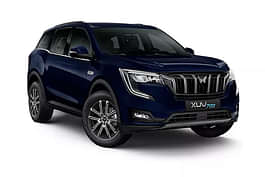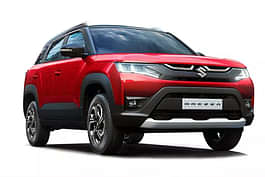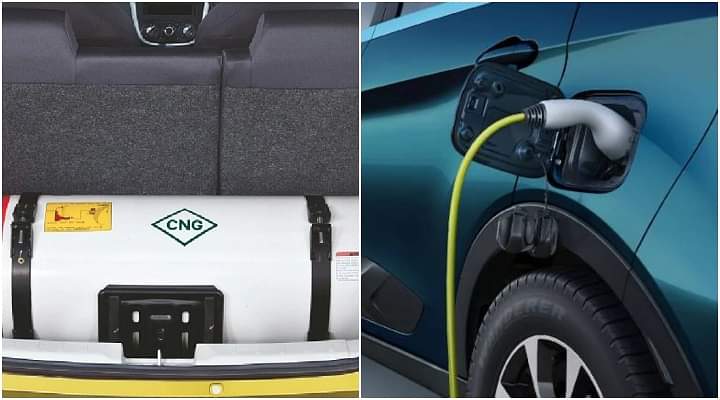
If you are concerned with the rising fuel prices or the lower fuel economy of your car then this article is for you. With the fuel prices speeding past Rs 100 mark for both petrol and diesel, fuelling up the tank to the brim is now a pinch in the pocket for the common man. However, there are other alternative options like CNG or electric cars that seem to have taken control of the situation and are acting as a relief to the car owners. In this article, we discuss the advantages and disadvantages of CNG vs Electric Cars and then finally bring our verdict on which of these you should choose!
CNG
CNG is short for Compressed Natural Gas. This is an alternative fuel option that has been around for many years now. CNG kits are even being offered as a factory-fitment on some cars. True, the cylinder takes up most of the boot space but offers a greater fuel economy in return. Right from the humble Maruti Suzuki Alto to the Toyota Innova Crysta petrol, we have seen CNG in most of the cars where fuel economy is a major concern.
Advantages
Pocket Friendly
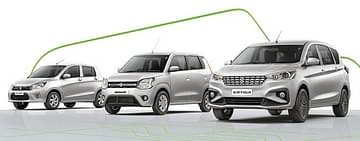
Here, we have included both the fitment as well as the running costs. A good CNG fitment from an authorised aftermarket dealer will cost you around Rs 60,000, inclusive of all taxes along with the RC endorsement. But, the running costs come out to be even lesser than Rs 2 per kilometre for some cars.
Also Read: Top 10 Upcoming CNG Cars In India Soon - Maruti Dzire to Innova Crysta
Switchable option
CNG gives you the freedom of driving the car on petrol too. If the CNG tank is emptied then you can also drive your car in petrol mode and fuel up the CNG tank at the nearest pump.
Lower emission than petrol
CNG also burns more cleanly than Petrol or Diesel, which means the tailpipe emissions are much lower. So, basically, CNG cars are a lot less polluting, thereby being more environment-friendly.
Disadvantages
Non-availability of CNG pumps across India
CNG is still an emerging alternate fuel type and is mostly found in metro cities like Delhi and Mumbai. The whole infrastructure is still in the development phase and this is the sole reason why most carmakers are giving second thoughts about launching CNG-powered versions of their mass-market cars.
No Usable Boot Space
This must have been a huge pain point for you if you own a CNG vehicle. Yes, CNG-powered sedans have more boot space left when compared to hatchbacks but still, it is a major concern. In a small hatchback, the boot is filled up entirely by the CNG tank and then, for the luggage, you might end up having to go for the aftermarket roof carrier.
Decrease In Performance
A vehicle running on CNG has at least a 10% decrease in performance in comparison to running on petrol. For example, the Maruti Alto 800 produces 47 bhp of maximum power and 69 Nm of peak torque in petrol while its CNG version kicks out only 40 bhp and 60 Nm.
Electric Cars
As they say, the future is electric! An electric car is effortless to drive and it packs in the outright punch that the enthusiasts long for. We discuss the positives and negatives of buying an electric car in India
Advantages
Tax benefits
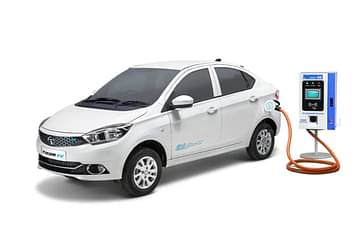
Even before the running costs come into place, owning an electric vehicle is has become easier as government has started offering several tax benefits on purchase of EVs. In addition to it, several states have subsidies that reduce the purchase price.
Cheaper to run
If you calculate the overall costs with petrol or CNG, electric vehicles turn out to be a much cheaper alternative. For the performance these cars offer, the cost of electricity is simply marginal.
Convenience of Automatic
All-electric vehicles are offered with a single-gear automatic transmission that makes them convenient to use on highways and traffic-infested roads.
Zero emissions
Electric vehicles have zero tailpipe emissions, which makes them even greener than CNG-powered vehicles.
Fast charging
Charging an electric vehicle may take as much as 6-8 hours but with the help of fast charging technology, 0-80% battery can be juiced in less than 60 minutes. All this is possible because of the fast-increasing availability of fast chargers at several key locations on major routes.
Disadvantages
Range anxiety
Believe it or not, this is one of the biggest points why people hold back their decision to go for an electric car. Yes, the ARAI claims a higher range figure but driving range of an EV depends on various conditions that are often not in one's control.
Underdeveloped EV Infrastructure
India is a developing country and the availability of charging stations is still quite low. That said, things have been changing at a rapid pace and in the years to come, this might no more be a cause of concern.
Too expensive
The cheapest electric SUV, Tata Nexon starts from Rs 14 lakh whereas its petrol model starts at just Rs 7.20 lakh, ex-showroom, Delhi. This makes EVs a lot costlier than their ICE-siblings.
Also Read: VW Taigun vs Hyundai Creta - Features, Specs, Prices Compared
Battery Costs
Most of the carmakers are providing 8 years warranty on the battery but what happens after that? The battery costs are higher than most other components of the car and changing them would be certainly a major expense. Maybe, as we move forward in time, the technology advancements will lead to lowering of the battery costs by a margin.
So what do you think about CNG vs Electric Cars? Which one will you pick and why? Do let us know about your thoughts in the comments section below. Also, make sure you are a member of our 91Wheels Whatsapp and 91Wheels Telegram group where we bring you all the latest updates related to the Indian Automotive Industry.
Do subscribe to our 91Wheels Youtube Channel where we bring the latest reviews, performance runs, mileage tests, comparisons and others.



